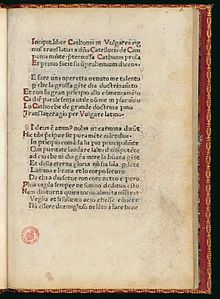Disticha Catonis
Disticha Catonis (" Distichen Catos", formerly also Dicta Catonis "Sprüche Catos") is the name of a Latin collection of ethical rules of unknown authorship. The script is believed to be from the late third or early fourth century. She ascribes her title to the elder Cato ; his name was considered the epitome of moral authority.
Structure and content
The work consists of an introduction to prose, 57 short maxims ( breves sententiae , probably medieval, also in prose) and four books of moral sayings in pairs of hexameters . The proverbs often propagate humility, patience and long-suffering; its tenor is clearly apolitical.
Tradition and continuation
Due to their great popularity in the Middle Ages and their use in Latin elementary lessons, the disticha survived the Middle Ages in numerous manuscripts. Early editions are by Erasmus von Rotterdam (Leuven 1517) and Joseph Justus Scaliger (Leiden 1598). In the Middle Ages and in modern times up to the 19th century they were enormously widespread school reading and were used both for acquiring the Latin language and for moral “basic training”. There have been translations into most of the European languages (into German since the 13th century), as well as repackaging, commentaries and extensions. Benjamin Franklin translated them into English in 1735 .
Text output
- Disticha Catonis. Recensuit et apparatu critico instruxit Marcus Boas. Opus post Marci Boas mortem edendum curavit Henricus Johannes Botschuyver. North-Holland Publishing Company, Amsterdam 1952 (Relevant Critical Edition).
literature
- Klaus Sallmann : Dicta M. Catonis ad filium suum (so-called Disticha Catonis). In: Klaus Sallmann (ed.): The literature of upheaval. From Roman to Christian literature, AD 117 to 284 (= Handbook of Ancient Latin Literature , Volume 4). CH Beck, Munich 1997, ISBN 3-406-39020-X , pp. 608-612
- Michael Baldzuhn : School Books in the Trivium of the Middle Ages and the Early Modern Age. The writing of lessons in the text and tradition history of the "Fabulae" Avians and the German "Disticha Catonis" (= sources and research on literary and cultural history. Vol. 44 = 278, 1–2). 2 volumes. de Gruyter, Berlin et al. 2009, ISBN 978-3-11-019351-0 , vol. 1, pp. 135–430, vol. 2, pp. 922–995 (also: Münster, Universität, habilitation paper, 2006) .
- Multilingualism in the Middle Ages: cultural, literary, linguistic and didactic constellations from a European perspective, with case studies on the 'Disticha Catonis'. Berlin: de Gruyter, 2011.
- Franz Skutsch : Dicta Catonis . In: Paulys Realencyclopadie der classischen Antiquity Science (RE). Volume V, 1, Stuttgart 1903, Col. 358-370 (outdated).
Web links
- Latin text in the Latin Library
- Latin text including introductory letter and breviores sententiae
- Brief description
- Database of German translations; with introduction, list of literature and lots of additional information
- Pseudo-Cato (vulgo Disticha Catonis) . Gerard Leeu, Antwerp 1. III. 1485 ( digitized version )
